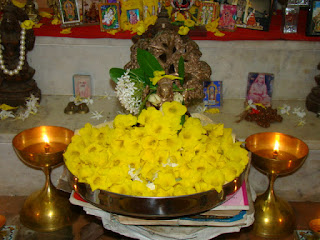Çivamänasa-Püjä
Spiritual emotion is
roused to a high pitch by the recitation of stotras,
which are therefore regarded as the most tangible form of worship – a point
nicely expressed in the well-known verse of the Çivamänasa-Püjä, itself
inspired by an Upaniñadic text –
Mänasa-Püjä
means a mental worship. It is a form of saguna-brahma-vishaya-mänasa-vyäpara,
meaning it is a mental activity relating to Saguëa-Brahman.
In
Çivamänasa-Püjä, the entire form of worship is done mentally. Whatever is
performed with the limbs in a regular Püjä, is done mentally, but very vividly,
as though it is done physically. This is called mänasa-püjä. It is as effective as the physical ritual, and
sometimes more effective, if it is made real.
The
püjä that is performed physically at
an altar can also be performed mentally. How real it is? When one is doing püjä mentally, one can pick up a flower
at will. When one does it for real, one need to fetch the flowers. One can do
the püjä quite vividly in one’s mind.
One gets a certain insight into the ways of the thinking also. Besides that, it
generates a condition for discovering the devotee in one. Just as one becomes a
friend by behaving in a friendly manner, similarly one can become a devotee by
being devout. The Çivamänasa-Püjä has a cultural overtone naturally, because it
is composed by Çri Çaìkara. The method of worship is based on how it is done in
India.
Text in Roman script with
Translation
ratnaih
kalpitam-äsanam himajalaih snänam ca divyämbaram
nänä-ratna-vibhüshitam
mrgamadämodänkitam candanam |
jäté-campaka-bilvapatra-racitam
pushpam ca dhüpam tathä
dépam
deva dayänidhe pasupate hrt-kalpitam grhyatäm ||1||
I offer you mentally, a throne studded with
precious stones, a bath with Ganga-water, celestial robes adorned with many
gems, sandalwood paste mixed with musk to anoint your body, jasmine and campa flowers and Bilva leaves, burning
incense and a shining flame. O! Self-effulgent Lord! Ocean of compassion, and
the Lord of all living beings, may you receive what I offer with all my heart
and mind. (1)
sauvarne
navaratna-khanda-racite pätre ghrtam päyasam
bhakshyam
panca-vidham payodadhiyutam rambhäphalam pänakam |
säkänämayutam
jalam rucikaram karpüra-khandojjvalam
tämbülam
manasä mayä viracitam bhaktyä prabho svékuru ||2||
I offer you mentally with great devotion, payasam made with ghee (clarified
butter) in a golden bowl inlaid with
nine precious stones, the five kind of food made with milk and curd, many
vegetables, fruit-salad with bananas, clean and tasty water, betel leaf and nut
mixed with camphor. May you receive them, O Lord! (2)
chatram
cämarayor-yugam vyajanakam cädarsakam nirmalam
vinä-bhei-mrdanga-kähalakalä-gétam
ca nrtyam tathä |
säshtängam
pranatih stutir-bahuvidhä hi-etat-samastam mayä
sankalpena
samarpitam tava vibho! püjäm grhänam prabho! ||3||
Along with my sankalpa (volition), I offer you a pair of fans, an umbrella, and a
spotless mirror, musical performance of Vinä, Bheri, and Mrdanga, followed by a
dance performance, my ashtanga-namaskaram,
and this manifold eulogy. O Lord! Who is all pervasive, may you please receive
this worship! (3)
ätmä
tvam girijä matih sahacaräh pränäh saréram grham
püjä
te vishayopabhoga-racanä nidrä samädhi-sthitih |
sancärah
padayoh pradakshina-vidhih stoträni sarvä giro-
yad-yat-karma
karomi tat-tad-akhilam sambho! tavärädhanam ||4||
Thou art Ätman; Girija thy spouse, is the
mind; thine attendants are the vital breaths; thy abode is the body; thy
worship lies in ministering to the enjoyment of the sense objects or projection
of the sensuous world of enjoyment; the repose in sleep constitutes samadhi;
our locomotion is tantamount to the process of circumambulation with the feet;
all the words are hymns to thee. O Sambhu (Siva), all that I perform is thy
worship.
My body is your temple. My mind is wedded to
you. My five organs of action and my physiological functions are your servants.
My body is a house for you. I offer you all the pleasure of my senses. I remain
resolved in you, in my sleep. Whenever I walk, I am going around you.
Everything I say is in praise of you. Whatever I do is a form of worship unto
you, O Lord! (4)
kara-carana-krtam
väk-käyajam karmajam vä
sravana-nayanajam
vä mänasam väparädham |
vihitam-avihitam
vä sarvam-etat ksamasva
jaya
jaya karunäbdhe sré-mahadeva-sambho !||5||
Whatever omissions and commissions I have
performed with my hands, legs, speech, body, sense organs, organs of action,
whatever I may have done with reference to enjoined (vihitam) or prohibited (avihitam)
{alternate reading - known (viditam)
or unknown (aviditam)} actions,
please forgive them all, O! Lord Mahädeva! O! Ocean of compassion! (5)
***


No comments:
Post a Comment